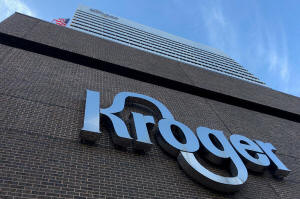US FTC suing to block $25 billion Kroger-Albertsons supermarket deal
 Send a link to a friend
Send a link to a friend
 [February 27, 2024] By
David Shepardson and Chris Sanders [February 27, 2024] By
David Shepardson and Chris Sanders
WASHINGTON (Reuters) -The U.S. Federal Trade Commission and eight states
said on Monday they are suing to block supermarket chain Kroger's $24.6
billion deal to buy smaller rival Albertsons, saying it would boost
grocery prices for millions of Americans.
The deal, which would create a grocery empire with more than 4,000
stores, has drawn tough scrutiny from lawmakers and consumer groups
worried about higher grocery prices, job losses, store closures and
diminishing choice for consumers.
U.S. food prices have risen by 25% over the last four years, and while
food inflation is showing signs of cooling off in 2024, grocery bills
have become a growing concern for shoppers.
The deal would strengthen Kroger's position as the second largest player
in the US grocery market behind Walmart.
The FTC's lawsuit comes at a time when the Biden administration has
pressed for lower grocery prices and pushed back against big-ticket
mergers that risk price hikes, affecting consumers in areas ranging from
medicines to airline tickets.
The White House, after the FTC suit was announced, said President Joe
Biden believes large corporations must be checked by healthy
competition.
Shares of Kroger fell 2%. Albertsons stock rose 0.6%. The deal spread, a
measure of investor confidence in the merger, implies less than 40%
chance of the deal being completed.
While the FTC charged the deal will eliminate "fierce competition
between Kroger and Albertsons," Kroger defended their business model,
saying it has reduced prices every year since 2003 and would be applied
to the merged company.

The FTC's legal efforts "only strengthens larger, non-unionized
retailers like Walmart WMT.N>, Costco COST.O> and Amazon.com by allowing
them to further increase their overwhelming and growing dominance of the
grocery industry," Kroger said in a statement.
An Albertsons spokesperson added, "We are disappointed that the FTC
continues to use the same outdated view of the U.S. grocery industry it
used 20 years ago, and we look forward to presenting our arguments in
Court."
But the FTC sees the situation differently, noting the "supermarket mega
merger comes as American consumers have seen the cost of groceries rise
steadily over the past few years," and warning the deal would further
exacerbate "the financial strain consumers across the country face
today," said Henry Liu, Director of the FTC’s Bureau of Competition.
California Attorney General Rob Bonta has also raised concerns over
access to pharmacies and fresh groceries in rural areas and small towns.
Arizona, California, the District of Columbia, Illinois, Maryland,
Nevada, New Mexico, Oregon and Wyoming are joining the commission’s
federal lawsuit.
[to top of second column] |

The Kroger supermarket chain's headquarters is shown in Cincinnati,
Ohio, U.S., June 28, 2018. REUTERS/Lisa Baertlein/File Photo/File
Photo

The FTC warned the merger would hurt the grocery store unions
because the combined company "would have more leverage to impose
subpar terms on union grocery workers that slow improvements to
wages, worsen benefits, and potentially degrade working conditions."
The decision comes after two U.S. states - Colorado and Washington -
sued to block the merger, citing similar concerns.
The FTC asked a U.S. District Court in Oregon to halt the merger
pending a full examination of the proposed transaction in an
administrative proceeding it filed Monday before an in-house
administrative judge. The two complaint process is similar to other
major FTC antitrust challenges including Microsoft Activision. In
practice, if an injunction is issued and upheld, the parties often
agree to abandon their deal.
The case was filed in federal court in Oregon and assigned to Judge
Adrienne Nelson, a former Oregon Supreme Court justice appointed by
President Biden and confirmed by the Senate in 2023.
SELLING 413 STORES
Kroger, the biggest grocer in the U.S. by revenue, has proposed to
divest 413 stores and eight distribution centers to C&S Wholesale
Grocers, and said it may need to shed an additional 237 stores to
gain regulatory approval. The FTC called that proposal inadequate.
Antitrust legal scholar Christine Bartholomew said a key question in
the FTC’s case will focus on whether the proposed deal poses a
potential risk to competition. Kroger and Albertsons were likely to
spotlight the “potential gains of the merger and the curative value
of the divestiture,” she said.
“But such claims will need actual backing,” said Bartholomew, who
teaches at University of Buffalo’s law school. Any assertion from
the two companies that the merger will create greater efficiency,
she added, “doesn't save a merger. The gains must offset any
potential anticompetitive harm.”
The deal was also opposed by at least six U.S. lawmakers, including
Senators Elizabeth Warren and Bernie Sanders, who have written to
the FTC highlighting the impact on consumers and suppliers from such
a consolidation in the grocery industry.
The merger, first announced in October 2022, also faced resistance
from the United Food and Commercial Workers International Union,
which represents more than 1 million workers in the grocery and
other essential industries in North America, and voted to oppose the
deal in May last year.
(Reporting by David Shepardson; Additional reporting by Juveria
Tabassum and Deborah Sophia; Editing by Chris Sanders, Alistair Bell
and Shri Navaratnam)
[© 2024 Thomson Reuters. All rights
reserved.]
This material may not be published,
broadcast, rewritten or redistributed.
Thompson Reuters is solely responsible for this content.
 |